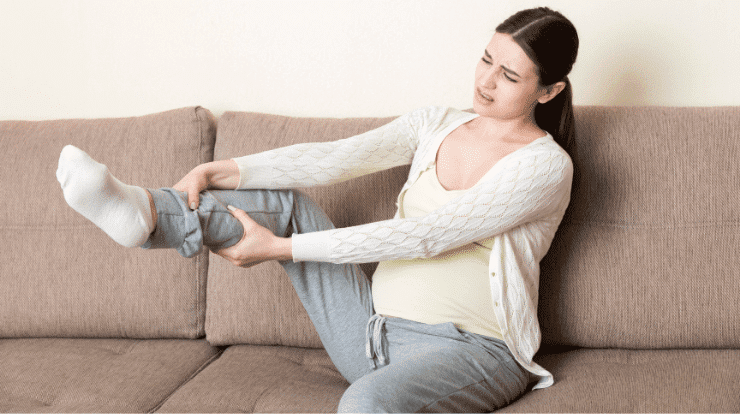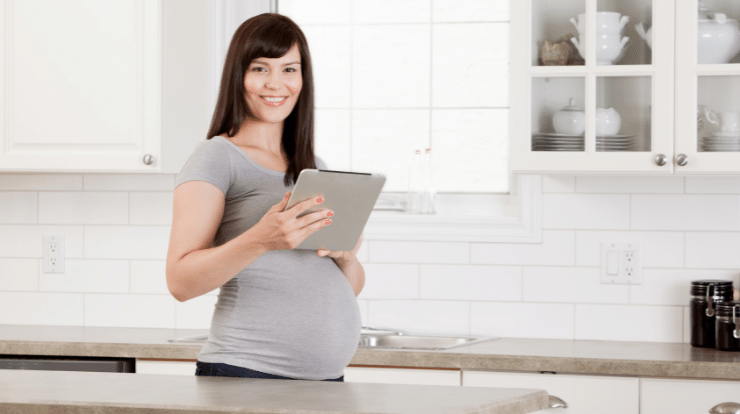
What causes swelling in feet during pregnancy?
Swelling in feet during pregnancy is one of the most common signs during this period. The problem is commonly observed in most women. In fact, the swelling of the feet during pregnancy is the result of the shifting of the weight from the rest of the body to the feet. It is also caused by the increased blood flow in the pelvic region and in the legs. As your body goes through major changes during pregnancy, your body produces more blood as a result of the increase in body metabolism. However, the important thing to note is that swelling in the feet during pregnancy is normal and does not always indicate pregnancy complications.
Pregnant women will experience swelling in the feet during pregnancy, as well as in the hands, ankles, and face as the pregnancy progresses. As the baby grows inside the womb and the woman starts carrying more weight, the ankles, feet, and legs will start to swell. Most often, the swelling that occurs during pregnancy will go down after delivery.
Swelling in feet during pregnancy when to worry?
Pregnancy can be a joyous occasion. But it can also be a stressful time. There are many “normal” symptoms of pregnancy and others that are less so. Swelling in feet during pregnancy is one of the less normal ones. It can be worrying for women, and understandably so. The question is: when is swelling in feet during pregnancy cause for concern?
Some swelling is normal during pregnancy due to weight gain, weight distribution, and the increase in blood flow. But if it’s accompanied by other symptoms, such as pain or showing up in an unusual place on your body, it is important to see your doctor.
How to reduce swelling in feet during pregnancy?
Following are the top 12 home remedies for swollen feet during pregnancy:
1. Drink more water
If you experience swelling in your feet, you can try to reduce it by drinking more water. Water helps the body to flush out excess fluids and prevents the body from retaining excess water. Drinking at least six to eight glasses of water a day is the best way to reduce your swelling. It is best to drink water over other beverages because water doesn’t have any calories, which can contribute to bloating.
2. Increase potassium intake
Eating foods that are high in potassium is important as sometimes you can have too much fluid accumulating around your abdomen region. Getting enough potassium during pregnancy helps keep the right amount of fluids around your baby and amniotic sac. Getting enough potassium (as well as water) will cause less swelling to occur, especially in your legs.
3. Reduce sodium intake
One way to avoid swelling during pregnancy is to limit the amount of salt in your diet. By reducing the amount of salt in your diet, you will also lessen the amount of extra water you’ll have to carry around. A good place to start eliminating excess sodium from your diet is by monitoring what types of food you consume. Try to avoid pre-packaged and canned goods; these food options are often high in salt! Excess sodium can lead directly to swelling, so try not to add additional table salt when preparing or eating meals as well.
4. Reduce caffeine intake
Pregnant women who consume high amounts of caffeine are more likely to experience swelling in their feet, according to a recent study. The study, conducted by researchers at the University of Leicester in the UK, found that excessive levels of caffeine in pregnant women are linked to gestational pitting edema (GPE), a condition that causes the feet and legs to swell.
Researchers have previously linked GPE with other symptoms in pregnancy, such as morning sickness and nausea, but this is the first time a link has been made between excessive caffeine intake and swelling in pregnant women. The results of the study have been published in the journal Diabetes Care.

5. Wear loose and comfortable clothes
Pregnant women who wear tight or elastic clothes may experience swelling in the feet. It’s best to wear loose, comfortable clothing to avoid additional swelling. Tight clothes not only make postpartum bands worse and can also cause discomfort during pregnancy. Pregnant women should wear loose-fitting clothing or at least try to avoid tight elastic bands when opting for maternity skirts, dresses, cardigans, and sweaters with joggers.
6. Wear comfortable shoes
As a woman, it is a common thing to have swollen feet during pregnancy. That’s why it’s important to wear comfortable shoes during pregnancy. This can help reduce swelling in the feet during pregnancy.
7. Walk
If you are pregnant or planning to be, the feet are a common problem. The swelling of the feet is a common pregnancy symptom, often caused by fluid retention. As a result, the feet may feel tingly and uncomfortable. There are several things you can do to help reduce the swelling. One of the most important is to walk. A daily walk will help relieve your aching feet and reduce swelling.
8. Elevate your feet
According to a study published in the journal PLOS One, foot elevation can reduce swelling in pregnancy. Elevating your feet during pregnancy can reduce swelling in the feet and legs, a recent study revealed. The study involved 80 pregnant women.
Researchers asked the participants to either elevate their feet, abstain from elevating their feet, or refrain from participating in any of the other activities. They found that the feet of the women who elevated their feet were less swollen on the third and fifth days of the trial. The results were consistent among all the participants. However, they were not consistent with the findings of previous studies.
9. Swim
Swimming is an effective method of reducing swelling in the feet and ankles. pregnant women should exercise daily, including swimming. The buoyancy of the water will reduce the amount of weight on the feet and improve the blood flow to the legs, which is essential during pregnancy.
10. Get a massage
you can ease and even prevent swelling in your feet and the rest of your body by getting a massage. Massage therapy is highly beneficial during pregnancy, and it’s safe — as long as you get a professional massage.
11. Sleep on your left side
Swelling in the feet can be quite painful and uncomfortable. You may want to try different ways to reduce swelling and make your pregnancy more comfortable. Sleeping on the left side can reduce swelling in the feet.
12. Stay cool
When it’s hot outside especially if you’re pregnant, best to stay indoors during the heat of the day, avoid too much exercise and keep your fluid intake under control.
What to eat to reduce swelling in feet during pregnancy?
Foods that are also rich in potassium include:
- Bananas
- Fruit juices (Orange, Carrot, prune)
- Beets
- Spinach
- Yogurt
- Lentils
- Sweet potatoes
- Salmon
- Potatoes






